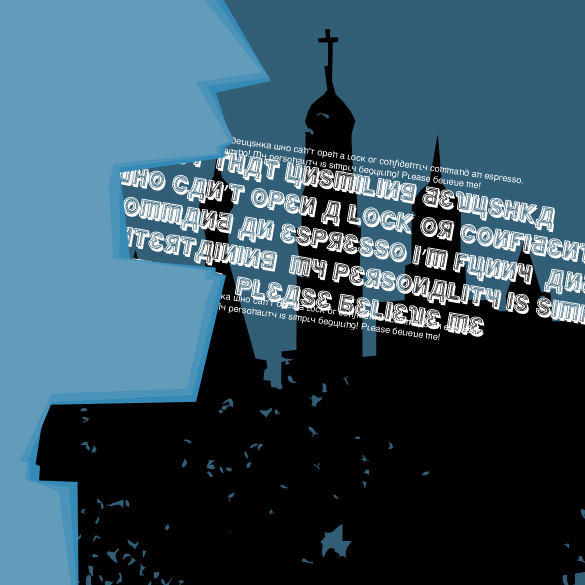 Life on the Other Side of the Language Gap
Life on the Other Side of the Language Gap
In a move that most people in my life are nice enough to accept but still don’t understand, I’m spending a year in St. Petersburg, Russia, after graduating with BA’s in poetry writing and French. I make my living teaching at an American preschool. With any energy I have left, I speak Russian with anyone who will put up with me, walk extensively, and get lost frequently. I’ll be writing monthly with new observations, meditations, and frustrations from a beautiful, strange, and very wet place.
A few years ago I tutored a Chinese student during his first summer in the U.S., before he started his freshman year of high school. He had studied English in school, but studying a language in school doesn’t always equal being able to put a sentence together. His English was actually pretty good—he understood his summer reading quite well, or, at least, he seemed to. He didn’t say much, and rarely even smiled. I always tried to be energetic and upbeat, asking him lots of questions and finding him graphic novels that I thought would catch his interest. During one of our sessions I saw him looking out the window of the library at the Alexander Calder sculpture in the square. I tried to explain the title — Tripes– and how it related to the sculpture as I saw it, with its squiggly black arms casting shadows on the ground that changed depending on when and how you looked at it.
Fast forward a few years later, and here I am in a new and foreign country with little grasp of the language, struggling to do something as simple as getting into my apartment (Russian novels are quite a ways down the road). You can’t appreciate a good capitalist lock until you come to Russia. American locks are modern, functional, to-the-point, while Russian locks have strangely-shaped keys that probably opened doors before the Cold War. The middle-aged Russian couple I live with gave me a quick demonstration (and explanation) on how to open (all three) locks to our apartment, but still I kept finding myself standing in front of the door to the hall, growing hot and frustrated as I stuck the key in the door and couldn’t turn it one way or another. I’d struggle like this until eventually the elevator opened and I stood aside as some other 8th-floor resident opened the door with ease and I muttered my favorite Russian expression, ya ne znayu (I don’t know). The old woman who lives next door to me liked to exclaim something like, oh, it’s that devushka (girl) who can’t open the door!
It’s an odd sensation, being that person on that far bank of the language gap. I am more aware of words than I could ever be with English. Suddenly words become real—look something up in a dictionary, put it in your pocket (figuratively, or, if it’s a long one, literally), and go out and try it on someone. That word is your shoe size, or cold medicine, or dinner. I think about the Chinese student, or the person in the D.C. metro who can’t understand how to get a fare card, or the “Spanish kid” in class in elementary school, and realize poignantly that we judge people only insofar as we understand them. We get frustrated when a child won’t follow directions, forgetting that they can’t understand the directions—they don’t know down from up, “take it out” from “put it away.” Or we see someone’s silence or inability to do simple things—like open a lock—as them being lazy, or clueless, or rude.
By speaking quietly, we don’t admit that we don’t quite know how to pronounce the words, or what words to say. By not smiling, we reject interaction, and say that we are just fine by ourselves. I wonder if those people I’ve observed in my own country have ever wanted to exclaim something to the effect of, “I’m not that unsmiling devushka who can’t open a lock or confidently command an espresso. I’m funny! And entertaining! My personality is simply beguiling! Please believe me!”
A year or two after that first summer, the Chinese student’s aunt got in touch with me again, asking if I could help prepare him for the SAT essay. When I went to meet him, the change was evident. I finally saw him smile, for one thing. He understood many difficult words and could explain himself, and more than that, he wanted to. He was willing to talk, not perfectly, but unselfconsciously. He had gained fluency, but also confidence.
Eventually I asked the woman I am living with to show me how to open the lock again. Da kontsa, da kontsa, she kept repeating. Finally I figured out what she was saying (thanks, Google Translate)—“to the end.” Jam that key in all the way, turn, pull the key and—the door opens. I’m now a master at getting into my apartment. A small accomplishment, but an accomplishment nonetheless.
I recently found that the Russian verb vladet’, “to own,” can be used to talk about mastering or speaking a language fluently—“I own that language.” Going to buy my monthly metro card resulted in a yelling match between me and woman at ticket desk. She asked me seemingly irrelevant questions that I probably only half understood, as I continued to insist on what I wanted. In the end, as people thrust their hands past me on either side to buy metro coins, I got my metro card, and it felt pretty good. The yelling felt good, because I was finally being aggressive with language, claiming the words as my own. If we say them like they’re foreign, we have no right to be surprised when we’re misunderstood. We might still be misunderstood, or given that quizzical look I’ve gotten so often when I put the wrong ending—or beginning—on some word or another, but at least we are speaking as if we have something to say.
I friend of mine—a native Russian speaker whose English is better than that of most Americans—once said in casual conversation, that there is a point when you embrace language, or maybe more truthfully, when language embraces you. I wish I could end this column with a, “And then one day,” but unfortunately, I can’t offer you that satisfaction. Russian has not embraced me, nor do I own it. (Meanwhile, my Russified English is getting much better, thanks to the influence of my Russian co-workers. “I put it on lockers?” “We talk to parents?” “I am getting up at six every day!”).
In a way, though, this is what’s beautiful about learning a new language—that you will never get to the end (da konstsa!). There are new victories and new frustrations at every turn. The language gap demands that we believe in ourselves in a way we never had to before— to believe that if we want to understand, eventually, we will.


“videt” (видеть) is to see, not to own. I think you mean “imet'” (иметь).. Not trying to be picky..
Fine writing by a bright and sensitive soul.
Mike, the verb that Ms. Geller defined as “to own” was владеть, not видеть. And one can indeed use this verb in sentences like “Она в совершенстве владеет английским языком.” (“She has perfect command of the English language”.)